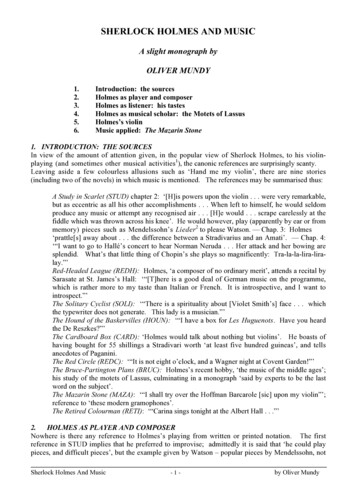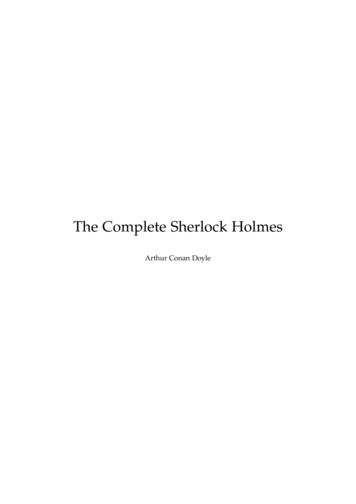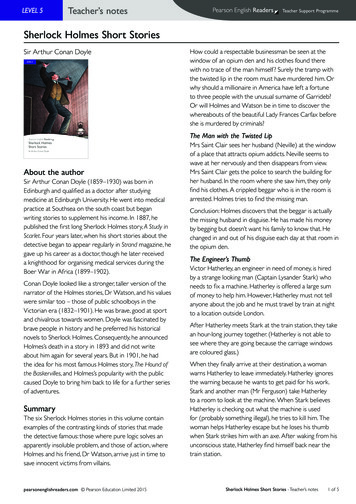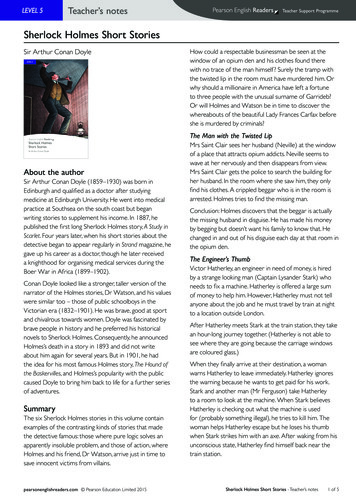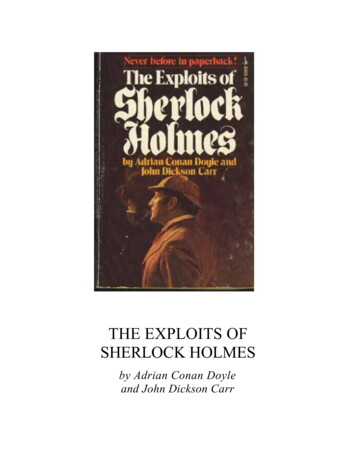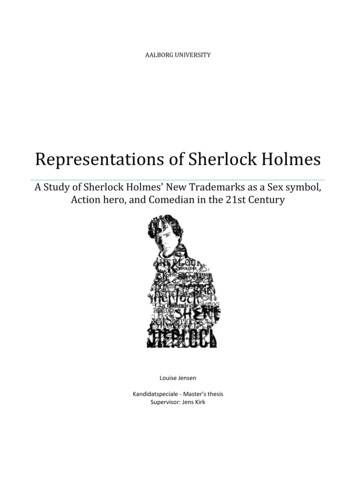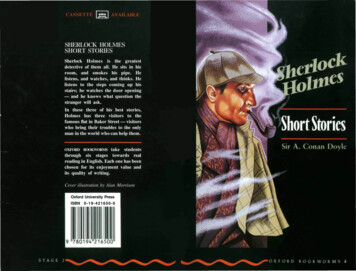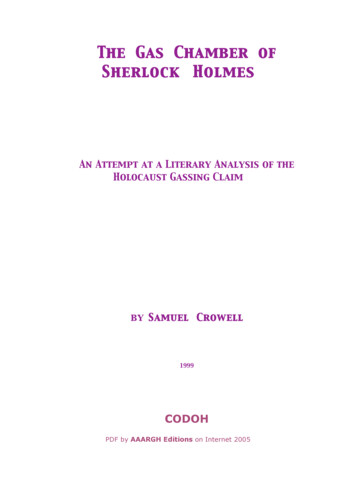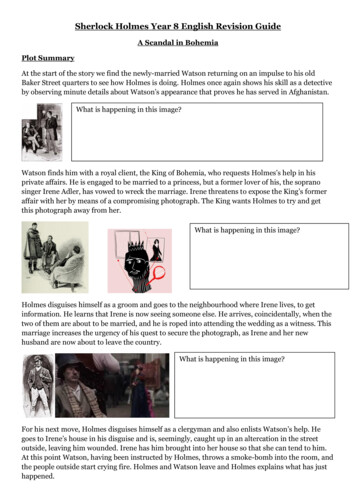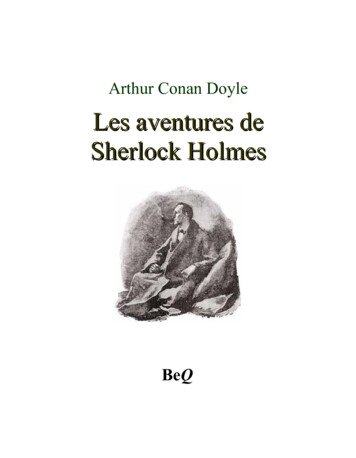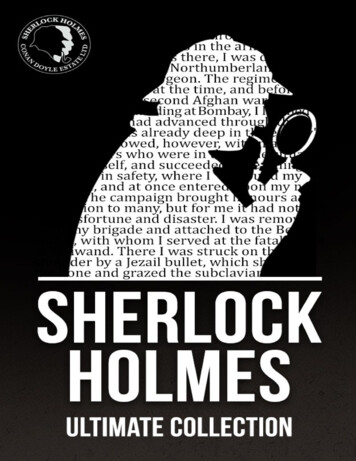
Transcription
Sherlock Holmes: The Ultimate Collectionby Arthur Conan Doyle
SHERLOCK HOLMES: THE COMPLETE COLLECTIONPublished by Maplewood Books.Published in 2014 by Maplewood Books with new Introduction, Literary Chronology, Film List, andOnline Resources.All rights reserved.All works by Arthur Conan Doyle.A Study in Scarlet was published in 1887, The Sign of the Four in 1890, The Hound of theBaskervilles in 1902, The Valley of Fear in 1915, The Adventures of Sherlock Holmes in 1892, TheMemoirs of Sherlock Holmes in 1883, The Return of Sherlock Holmes in 1904, His Last Bow in1917, and The Casebook of Sherlock Holmes in 1927.Stories from The Case-Book of Sherlock Holmes, together with the name and image of SherlockHolmes and Dr. Watson, are protected by copyright and trademark law in the United States, and areused by arrangement with Conan Doyle Estate Ltd.Maplewood Books is not affiliated with any of the websites linked in the text. All links are foreditorial purposes only.No part of this document may be reproduced or transmitted in any form or by any means, electronic orotherwise, without prior written permission by the publisher.To contact the publisher, please email info@maplewoodbooks.com
Table of ContentsCopyrightIntroductionA Study in ScarletThe Sign of the FourThe Adventures of Sherlock HolmesThe Memoirs of Sherlock HolmesThe Hound of the BaskervillesThe Return of Sherlock HolmesThe Valley of FearHis Last BowThe Casebook of Sherlock HolmesFan Resources:Film and Television AdaptationsBeyond the CanonAudio RecordingsPublisher's Note
INTRODUCTIONThere's no mystery about it: you hold in your hands the ultimate ebook collection of master sleuthSherlock Holmes.Included in Sherlock Holmes: The Ultimate Edition are four novels and fifty-six short storiesstarring Sherlock Holmes by Arthur Conan Doyle—that is, EVERY Sherlock Holmes story everwritten! Each work has been elegantly formatted for ease of use and enjoyment on your e-readerdevice.Titles included:Novels:A Study in ScarletThe Sign of the FourThe Hound of the BaskervillesThe Valley of FearShort Story Collections:The Adventures of Sherlock HolmesThe Memoirs of Sherlock HolmesThe Return of Sherlock HolmesHis Last BowThe Casebook of Sherlock HolmesStories and novels are presented here in publishing order, rather than separated by type (novel orshort story). This allows you to start at the beginning, when Sherlock Holmes is introduced in thenovel A Study in Scarlet, and continue through until the stories of The Casebook of Sherlock Holmes.Each book has an individual Table of Contents that is easily accessible from the main Table ofContents and drop-down menus. You are never more than two clicks away from any story of anybook.Also included are special features for any Holmes enthusiast, including:A list of films and television series starring the character Sherlock Holmes.Beyond the Canon: A Reading Guide to additional books about Sherlock Holmes by otherauthors.Links to free, full-length audio recordings of all the novels and short stories in this collection.Thank you for choosing this Maplewood Books edition. Turn the page and start the adventure. Thegame's afoot!
A STUDY IN SCARLETby Arthur Conan Doyle
Table of ContentsPART I.CHAPTER I. MR. SHERLOCK HOLMES.CHAPTER II. THE SCIENCE OF DEDUCTION.CHAPTER III. THE LAURISTON GARDEN MYSTERYCHAPTER IV. WHAT JOHN RANCE HAD TO TELL.CHAPTER V. OUR ADVERTISEMENT BRINGS A VISITOR.CHAPTER VI. TOBIAS GREGSON SHOWS WHAT HE CAN DO.CHAPTER VII. LIGHT IN THE DARKNESS.PART II. THE COUNTRY OF THE SAINTSCHAPTER I. ON THE GREAT ALKALI PLAIN.CHAPTER II. THE FLOWER OF UTAH.CHAPTER III. JOHN FERRIER TALKS WITH THE PROPHET.CHAPTER IV. A FLIGHT FOR LIFE.CHAPTER V. THE AVENGING ANGELS.CHAPTER VI. A CONTINUATION OF THE REMINISCENCES OF JOHN WATSON, M.D.CHAPTER VII. THE CONCLUSION.
PART I
CHAPTER I. MR. SHERLOCK HOLMES.IN the year 1878 I took my degree of Doctor of Medicine of the University of London, andproceeded to Netley to go through the course prescribed for surgeons in the army. Having completedmy studies there, I was duly attached to the Fifth Northumberland Fusiliers as Assistant Surgeon. Theregiment was stationed in India at the time, and before I could join it, the second Afghan war hadbroken out. On landing at Bombay, I learned that my corps had advanced through the passes, and wasalready deep in the enemy's country. I followed, however, with many other officers who were in thesame situation as myself, and succeeded in reaching Candahar in safety, where I found my regiment,and at once entered upon my new duties.The campaign brought honors and promotion to many, but for me it had nothing but misfortune anddisaster. I was removed from my brigade and attached to the Berkshires, with whom I served at thefatal battle of Maiwand. There I was struck on the shoulder by a Jezail bullet, which shattered thebone and grazed the subclavian artery. I should have fallen into the hands of the murderous Ghazis hadit not been for the devotion and courage shown by Murray, my orderly, who threw me across a packhorse, and succeeded in bringing me safely to the British lines.Worn with pain, and weak from the prolonged hardships which I had undergone, I was removed,with a great train of wounded sufferers, to the base hospital at Peshawar. Here I rallied, and hadalready improved so far as to be able to walk about the wards, and even to bask a little upon theverandah, when I was struck down by enteric fever, that curse of our Indian possessions. For monthsmy life was despaired of, and when at last I came to myself and became convalescent, I was so weakand emaciated that a medical board determined that not a day should be lost in sending me back toEngland. I was dispatched, accordingly, in the troopship "Orontes," and landed a month later onPortsmouth jetty, with my health irretrievably ruined, but with permission from a paternal governmentto spend the next nine months in attempting to improve it.I had neither kith nor kin in England, and was therefore as free as air—or as free as an income ofeleven shillings and sixpence a day will permit a man to be. Under such circumstances, I naturallygravitated to London, that great cesspool into which all the loungers and idlers of the Empire areirresistibly drained. There I stayed for some time at a private hotel in the Strand, leading acomfortless, meaningless existence, and spending such money as I had, considerably more freely thanI ought. So alarming did the state of my finances become, that I soon realized that I must either leavethe metropolis and rusticate somewhere in the country, or that I must make a complete alteration in mystyle of living. Choosing the latter alternative, I began by making up my mind to leave the hotel, and totake up my quarters in some less pretentious and less expensive domicile.On the very day that I had come to this conclusion, I was standing at the Criterion Bar, when someone tapped me on the shoulder, and turning round I recognized young Stamford, who had been adresser under me at Barts. The sight of a friendly face in the great wilderness of London is a pleasantthing indeed to a lonely man. In old days Stamford had never been a particular crony of mine, but nowI hailed him with enthusiasm, and he, in his turn, appeared to be delighted to see me. In theexuberance of my joy, I asked him to lunch with me at the Holborn, and we started off together in ahansom.
"Whatever have you been doing with yourself, Watson?" he asked in undisguised wonder, as werattled through the crowded London streets. "You are as thin as a lath and as brown as a nut."I gave him a short sketch of my adventures, and had hardly concluded it by the time that wereached our destination."Poor devil!" he said, commiseratingly, after he had listened to my misfortunes. "What are you upto now?""Looking for lodgings," I answered. "Trying to solve the problem as to whether it is possible toget comfortable rooms at a reasonable price.""That's a strange thing," remarked my companion; "you are the second man to-day that has usedthat expression to me.""And who was the first?" I asked."A fellow who is working at the chemical laboratory up at the hospital. He was bemoaninghimself this morning because he could not get someone to go halves with him in some nice roomswhich he had found, and which were too much for his purse.""By Jove!" I cried, "if he really wants someone to share the rooms and the expense, I am the veryman for him. I should prefer having a partner to being alone."Young Stamford looked rather strangely at me over his wine-glass. "You don't know SherlockHolmes yet," he said; "perhaps you would not care for him as a constant companion.""Why, what is there against him?""Oh, I didn't say there was anything against him. He is a little queer in his ideas—an enthusiast insome branches of science. As far as I know he is a decent fellow enough.""A medical student, I suppose?" said I."No—I have no idea what he intends to go in for. I believe he is well up in anatomy, and he is afirst-class chemist; but, as far as I know, he has never taken out any systematic medical classes. Hisstudies are very desultory and eccentric, but he has amassed a lot of out-of-the way knowledge whichwould astonish his professors.""Did you never ask him what he was going in for?" I asked."No; he is not a man that it is easy to draw out, though he can be communicative enough when thefancy seizes him.""I should like to meet him," I said. "If I am to lodge with anyone, I should prefer a man of studiousand quiet habits. I am not strong enough yet to stand much noise or excitement. I had enough of both inAfghanistan to last me for the remainder of my natural existence. How could I meet this friend ofyours?""He is sure to be at the laboratory," returned my companion. "He either avoids the place forweeks, or else he works there from morning to night. If you like, we shall drive round together afterluncheon.""Certainly," I answered, and the conversation drifted away into other channels.As we made our way to the hospital after leaving the Holborn, Stamford gave me a few moreparticulars about the gentleman whom I proposed to take as a fellow-lodger."You mustn't blame me if you don't get on with him," he said; "I know nothing more of him than Ihave learned from meeting him occasionally in the laboratory. You proposed this arrangement, so youmust not hold me responsible.""If we don't get on it will be easy to part company," I answered. "It seems to me, Stamford," Iadded, looking hard at my companion, "that you have some reason for washing your hands of thematter. Is this fellow's temper so formidable, or what is it? Don't be mealy-mouthed about it."
"It is not easy to express the inexpressible," he answered with a laugh. "Holmes is a little tooscientific for my tastes—it approaches to cold-bloodedness. I could imagine his giving a friend alittle pinch of the latest vegetable alkaloid, not out of malevolence, you understand, but simply out ofa spirit of inquiry in order to have an accurate idea of the effects. To do him justice, I think that hewould take it himself with the same readiness. He appears to have a passion for definite and exactknowledge.""Very right too.""Yes, but it may be pushed to excess. When it comes to beating the subjects in the dissectingrooms with a stick, it is certainly taking rather a bizarre shape.""Beating the subjects!""Yes, to verify how far bruises may be produced after death. I saw him at it with my own eyes.""And yet you say he is not a medical student?""No. Heaven knows what the objects of his studies are. But here we are, and you must form yourown impressions about him." As he spoke, we turned down a narrow lane and passed through a smallside-door, which opened into a wing of the great hospital. It was familiar ground to me, and I neededno guiding as we ascended the bleak stone staircase and made our way down the long corridor withits vista of whitewashed wall and dun-colored doors. Near the further end a low arched passagebranched away from it and led to the chemical laboratory.This was a lofty chamber, lined and littered with countless bottles. Broad, low tables werescattered about, which bristled with retorts, test-tubes, and little Bunsen lamps, with their blueflickering flames. There was only one student in the room, who was bending over a distant tableabsorbed in his work. At the sound of our steps he glanced round and sprang to his feet with a cry ofpleasure. "I've found it! I've found it," he shouted to my companion, running towards us with a testtube in his hand. "I have found a re-agent which is precipitated by haemoglobin, and by nothing else."Had he discovered a gold mine, greater delight could not have shone upon his features."Dr. Watson, Mr. Sherlock Holmes," said Stamford, introducing us."How are you?" he said cordially, gripping my hand with a strength for which I should hardlyhave given him credit. "You have been in Afghanistan, I perceive.""How on earth did you know that?" I asked in astonishment."Never mind," said he, chuckling to himself. "The question now is about haemoglobin. No doubtyou see the significance of this discovery of mine?""It is interesting, chemically, no doubt," I answered, "but practically——""Why, man, it is the most practical medico-legal discovery for years. Don't you see that it gives usan infallible test for blood stains. Come over here now!" He seized me by the coat-sleeve in hiseagerness, and drew me over to the table at which he had been working. "Let us have some freshblood," he said, digging a long bodkin into his finger, and drawing off the resulting drop of blood in achemical pipette. "Now, I add this small quantity of blood to a liter of water. You perceive that theresulting mixture has the appearance of pure water. The proportion of blood cannot be more than onein a million. I have no doubt, however, that we shall be able to obtain the characteristic reaction." Ashe spoke, he threw into the vessel a few white crystals, and then added some drops of a transparentfluid. In an instant the contents assumed a dull mahogany color, and a brownish dust was precipitatedto the bottom of the glass jar."Ha! ha!" he cried, clapping his hands, and looking as delighted as a child with a new toy. "Whatdo you think of that?""It seems to be a very delicate test," I remarked.
"Beautiful! beautiful! The old Guiacum test was very clumsy and uncertain. So is the microscopicexamination for blood corpuscles. The latter is valueless if the stains are a few hours old. Now, thisappears to act as well whether the blood is old or new. Had this test been invented, there arehundreds of men now walking the earth who would long ago have paid the penalty of their crimes.""Indeed!" I murmured."Criminal cases are continually hinging upon that one point. A man is suspected of a crime monthsperhaps after it has been committed. His linen or clothes are examined, and brownish stainsdiscovered upon them. Are they blood stains, or mud stains, or rust stains, or fruit stains, or what arethey? That is a question which has puzzled many an expert, and why? Because there was no reliabletest. Now we have the Sherlock Holmes' test, and there will no longer be any difficulty."His eyes fairly glittered as he spoke, and he put his hand over his heart and bowed as if to someapplauding crowd conjured up by his imagination."You are to be congratulated," I remarked, considerably surprised at his enthusiasm."There was the case of Von Bischoff at Frankfort last year. He would certainly have been hunghad this test been in existence. Then there was Mason of Bradford, and the notorious Muller, andLefevre of Montpellier, and Samson of New Orleans. I could name a score of cases in which it wouldhave been decisive.""You seem to be a walking calendar of crime," said Stamford with a laugh. "You might start apaper on those lines. Call it the 'Police News of the Past.'""Very interesting reading it might be made, too," remarked Sherlock Holmes, sticking a smallpiece of plaster over the prick on his finger. "I have to be careful," he continued, turning to me with asmile, "for I dabble with poisons a good deal." He held out his hand as he spoke, and I noticed that itwas all mottled over with similar pieces of plaster, and discolored with strong acids."We came here on business," said Stamford, sitting down on a high three-legged stool, andpushing another one in my direction with his foot. "My friend here wants to take diggings, and as youwere complaining that you could get no one to go halves with you, I thought that I had better bring youtogether."Sherlock Holmes seemed delighted at the idea of sharing his rooms with me. "I have my eye on asuite in Baker Street," he said, "which would suit us down to the ground. You don't mind the smell ofstrong tobacco, I hope?""I always smoke 'ship's' myself," I answered."That's good enough. I generally have chemicals about, and occasionally do experiments. Wouldthat annoy you?""By no means.""Let me see—what are my other shortcomings. I get in the dumps at times, and don't open mymouth for days on end. You must not think I am sulky when I do that. Just let me alone, and I'll soon beright. What have you to confess now? It's just as well for two fellows to know the worst of oneanother before they begin to live together."I laughed at this cross-examination. "I keep a bull pup," I said, "and I object to rows because mynerves are shaken, and I get up at all sorts of ungodly hours, and I am extremely lazy. I have anotherset of vices when I'm well, but those are the principal ones at present.""Do you include violin-playing in your category of rows?" he asked, anxiously."It depends on the player," I answered. "A well-played violin is a treat for the gods—a badlyplayed one——""Oh, that's all right," he cried, with a merry laugh. "I think we may consider the thing as settled—
that is, if the rooms are agreeable to you.""When shall we see them?""Call for me here at noon to-morrow, and we'll go together and settle everything," he answered."All right—noon exactly," said I, shaking his hand.We left him working among his chemicals, and we walked together towards my hotel."By the way," I asked suddenly, stopping and turning upon Stamford, "how the deuce did he knowthat I had come from Afghanistan?"My companion smiled an enigmatical smile. "That's just his little peculiarity," he said. "A goodmany people have wanted to know how he finds things out.""Oh! a mystery is it?" I cried, rubbing my hands. "This is very piquant. I am much obliged to youfor bringing us together. 'The proper study of mankind is man,' you know.""You must study him, then," Stamford said, as he bade me good-bye. "You'll find him a knottyproblem, though. I'll wager he learns more about you than you about him. Good-bye.""Good-bye," I answered, and strolled on to my hotel, considerably interested in my newacquaintance.
CHAPTER II. THE SCIENCE OF DEDUCTION.WE met next day as he had arranged, and inspected the rooms at No. 221B, Baker Street, of whichhe had spoken at our meeting. They consisted of a couple of comfortable bed-rooms and a single largeairy sitting-room, cheerfully furnished, and illuminated by two broad windows. So desirable in everyway were the apartments, and so moderate did the terms seem when divided between us, that thebargain was concluded upon the spot, and we at once entered into possession. That very evening Imoved my things round from the hotel, and on the following morning Sherlock Holmes followed mewith several boxes and portmanteaus. For a day or two we were busily employed in unpacking andlaying out our property to the best advantage. That done, we gradually began to settle down and toaccommodate ourselves to our new surroundings.Holmes was certainly not a difficult man to live with. He was quiet in his ways, and his habitswere regular. It was rare for him to be up after ten at night, and he had invariably breakfasted andgone out before I rose in the morning. Sometimes he spent his day at the chemical laboratory,sometimes in the dissecting-rooms, and occasionally in long walks, which appeared to take him intothe lowest portions of the City. Nothing could exceed his energy when the working fit was upon him;but now and again a reaction would seize him, and for days on end he would lie upon the sofa in thesitting-room, hardly uttering a word or moving a muscle from morning to night. On these occasions Ihave noticed such a dreamy, vacant expression in his eyes, that I might have suspected him of beingaddicted to the use of some narcotic, had not the temperance and cleanliness of his whole lifeforbidden such a notion.As the weeks went by, my interest in him and my curiosity as to his aims in life, graduallydeepened and increased. His very person and appearance were such as to strike the attention of themost casual observer. In height he was rather over six feet, and so excessively lean that he seemed tobe considerably taller. His eyes were sharp and piercing, save during those intervals of torpor towhich I have alluded; and his thin, hawk-like nose gave his whole expression an air of alertness anddecision. His chin, too, had the prominence and squareness which mark the man of determination. Hishands were invariably blotted with ink and stained with chemicals, yet he was possessed ofextraordinary delicacy of touch, as I frequently had occasion to observe when I watched himmanipulating his fragile philosophical instruments.The reader may set me down as a hopeless busybody, when I confess how much this manstimulated my curiosity, and how often I endeavored to break through the reticence which he showedon all that concerned himself. Before pronouncing judgment, however, be it remembered, howobjectless was my life, and how little there was to engage my attention. My health forbade me fromventuring out unless the weather was exceptionally genial, and I had no friends who would call uponme and break the monotony of my daily existence. Under these circumstances, I eagerly hailed thelittle mystery which hung around my companion, and spent much of my time in endeavoring to unravelit.He was not studying medicine. He had himself, in reply to a question, confirmed Stamford'sopinion upon that point. Neither did he appear to have pursued any course of reading which might fithim for a degree in science or any other recognized portal which would give him an entrance into the
learned world. Yet his zeal for certain studies was remarkable, and within eccentric limits hisknowledge was so extraordinarily ample and minute that his observations have fairly astounded me.Surely no man would work so hard or attain such precise information unless he had some definite endin view. Desultory readers are seldom remarkable for the exactness of their learning. No man burdenshis mind with small matters unless he has some very good reason for doing so.His ignorance was as remarkable as his knowledge. Of contemporary literature, philosophy andpolitics he appeared to know next to nothing. Upon my quoting Thomas Carlyle, he inquired in thenaivest way who he might be and what he had done. My surprise reached a climax, however, when Ifound incidentally that he was ignorant of the Copernican Theory and of the composition of the SolarSystem. That any civilized human being in this nineteenth century should not be aware that the earthtravelled round the sun appeared to be to me such an extraordinary fact that I could hardly realize it."You appear to be astonished," he said, smiling at my expression of surprise. "Now that I do knowit I shall do my best to forget it.""To forget it!""You see," he explained, "I consider that a man's brain originally is like a little empty attic, andyou have to stock it with such furniture as you choose. A fool takes in all the lumber of every sort thathe comes across, so that the knowledge which might be useful to him gets crowded out, or at best isjumbled up with a lot of other things so that he has a difficulty in laying his hands upon it. Now theskillful workman is very careful indeed as to what he takes into his brain-attic. He will have nothingbut the tools which may help him in doing his work, but of these he has a large assortment, and all inthe most perfect order. It is a mistake to think that that little room has elastic walls and can distend toany extent. Depend upon it there comes a time when for every addition of knowledge you forgetsomething that you knew before. It is of the highest importance, therefore, not to have useless factselbowing out the useful ones.""But the Solar System!" I protested."What the deuce is it to me?" he interrupted impatiently; "you say that we go round the sun. If wewent round the moon it would not make a pennyworth of difference to me or to my work."I was on the point of asking him what that work might be, but something in his manner showed methat the question would be an unwelcome one. I pondered over our short conversation, however, andendeavored to draw my deductions from it. He said that he would acquire no knowledge which didnot bear upon his object. Therefore all the knowledge which he possessed was such as would beuseful to him. I enumerated in my own mind all the various points upon which he had shown me thathe was exceptionally well-informed. I even took a pencil and jotted them down. I could not helpsmiling at the document when I had completed it. It ran in this way—SHERLOCK HOLMES—his limits.1. Knowledge of —Nil.4.Politics.—Feeble.5.Botany.—Variable. Well up in belladonna,opium, and poisons generally.Knows nothing of practical gardening.6.Geology.—Practical, but limited.Tells at a glance different soilsfrom each other. After walks hasshown me splashes upon his trousers,and told me by their color and
consistence in what part of Londonhe had received , but unsystematic.9.Sensational Literature.—Immense. He appearsto know every detail of every horrorperpetrated in the century.10. Plays the violin well.11. Is an expert singlestick player, boxer, and swordsman.12. Has a good practical knowledge of British law.When I had got so far in my list I threw it into the fire in despair. "If I can only find what thefellow is driving at by reconciling all these accomplishments, and discovering a calling which needsthem all," I said to myself, "I may as well give up the attempt at once."I see that I have alluded above to his powers upon the violin. These were very remarkable, but aseccentric as all his other accomplishments. That he could play pieces, and difficult pieces, I knewwell, because at my request he has played me some of Mendelssohn's Lieder, and other favorites.When left to himself, however, he would seldom produce any music or attempt any recognized air.Leaning back in his arm-chair of an evening, he would close his eyes and scrape carelessly at thefiddle which was thrown across his knee. Sometimes the chords were sonorous and melancholy.Occasionally they were fantastic and cheerful. Clearly they reflected the thoughts which possessedhim, but whether the music aided those thoughts, or whether the playing was simply the result of awhim or fancy was more than I could determine. I might have rebelled against these exasperatingsolos had it not been that he usually terminated them by playing in quick succession a whole series ofmy favorite airs as a slight compensation for the trial upon my patience.During the first week or so we had no callers, and I had begun to think that my companion was asfriendless a man as I was myself. Presently, however, I found that he had many acquaintances, andthose in the most different classes of society. There was one little sallow rat-faced, dark-eyed fellowwho was introduced to me as Mr. Lestrade, and who came three or four times in a single week. Onemorning a young girl called, fashionably dressed, and stayed for half an hour or more. The sameafternoon brought a grey-headed, seedy visitor, looking like a Jew pedlar, who appeared to me to bemuch excited, and who was closely followed by a slip-shod elderly woman. On another occasion anold white-haired gentleman had an interview with my companion; and on another a railway porter inhis velveteen uniform. When any of these nondescript individuals put in an appearance, SherlockHolmes used to beg for the use of the sitting-room, and I would retire to my bed-room. He alwaysapologized to me for putting me to this inconvenience. "I have to use this room as a place ofbusiness," he said, "and these people are my clients." Again I had an opportunity of asking him a pointblank question, and again my delicacy prevented me from forcing another man to confide in me. Iimagined at the time that he had some strong reason for not alluding to it, but he soon dispelled theidea by coming round to the subject of his own accord.It was upon the 4th of March, as I have good reason to remember, that I rose somewhat earlierthan usual, and found that Sherlock Holmes had not yet finished his breakfast. The landlady hadbecome so accustomed to my late habits that my place had not been laid nor my coffee prepared. Withthe unreasonable petulance of mankind I rang the bell and gave a curt intimation that I was ready.Then I picked up a magazine from the table and attempted to while away the time with it, while mycompanion munched silently at his toast. One of the articles had a pencil mark at the heading, and Inaturally began to run my eye through it.Its somewhat ambitious title was "The Book of Life," and it attempted to show how much an
observant man might learn by an accurate and systematic examination of all that came in his way. Itstruck me as being a remarkable mixture of shrewdness and of absurdity. The reasoning was closeand intense, but the deductions appeared to me to be far-fetched and exaggerated. The wr
Sherlock Holmes. Included in Sherlock Holmes: The Ultimate Edition are four novels and fifty-six short stories starring Sherlock Holmes by Arthur Conan Doyle—that is, EVERY Sherlock Holmes story ever written! Each work has been elegantly formatted for ease of use and enjoyment on your e-r
